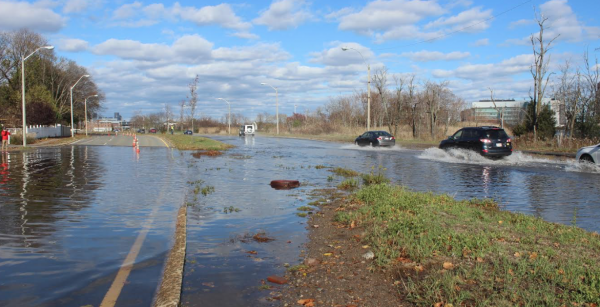November 28, 2023

Morrissey Boulevard floods routinely due to high tides. Reporter file photo
A commission charged with coordinating state and city resources to plan critical improvements to Morrissey Boulevard and related infrastructure will convene for its first meeting this evening, more than one year after a measure authorizing its formation was passed into law.
A description of today’s meeting supplied by the Mass Dept. of Transportation agency said: “At this meeting there will be an introduction of Commission members and a presentation on the study's evaluation of existing and future multimodal transportation conditions in the area. This will be followed by a discussion among members of the Commission and a public comment period.”
The meeting of the Morrissey Boulevard Commission will take place in-person at the Southline building — the former Boston Globe —from 6-8 p.m. The meeting can also be viewed online and will be recorded, according to a project page set up by Mass DOT.
Details have been scarce about the commission’s membership, its scope, and the timeframe of its work. When it was first proposed in a state transportation bill last year, its sponsors envisioned a report on findings by June 2023. It is believed that the commission will include elected officials who represent the area, along with designated officials from state and city agencies, including the state’s Dept. of Conservation and Recreation and the city’s Transportation Department.
Mayor Michelle Wu’s office said today that the mayor plans to attend and speak at this evening’s meeting.
A MassDOT spokesperson did not respond to the Reporter’s request for more information ahead of the meeting. A contact number listed on the commission’s project page was not in service on Tuesday.
Morrissey Boulevard has been the subject of previous studies and state projects that sought to modernize it and elevate the roadway, part of which runs along a man-made corridor that slices through Dorchester Bay. The roadway is prone to flooding caused by high tides, a situation that experts believe will worsen with rising sea levels caused by climate change.
However, in two instances in the last four decades, state-run efforts to plan comprehensive rehabilitation projects have stalled or been shelved entirely.
See this page for more information on the commission.


